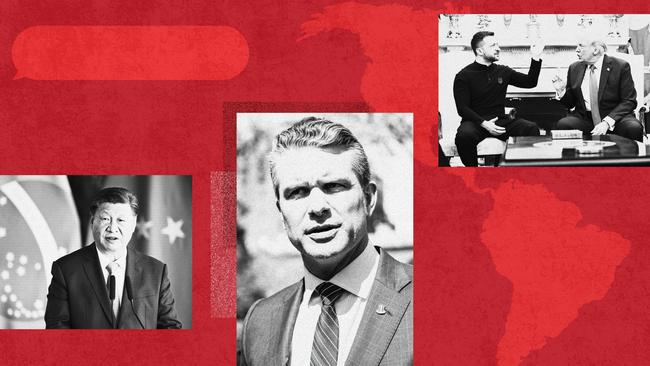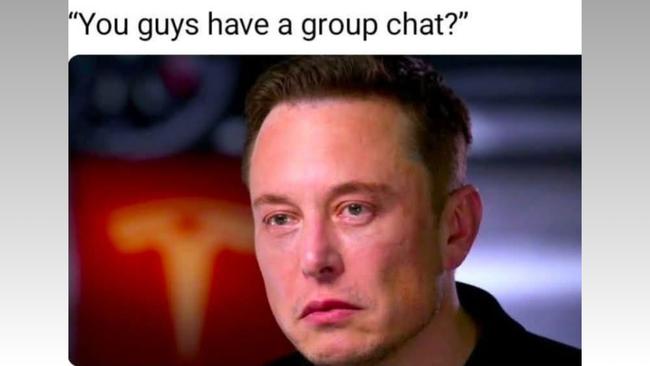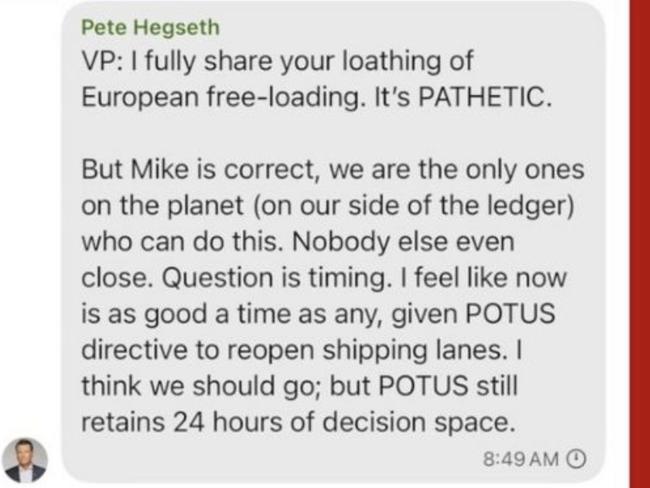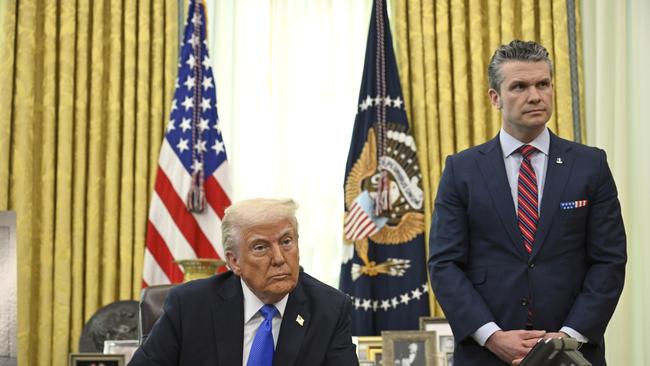A quick history lesson for the US from the European freeloaders
For decades the US required allies to be militarily subservient — and President Trump should be careful what he wishes for.

When is a plan for a war not a war plan? Search me. Instead, ask Pete Hegseth, the US defence secretary, and the man who did - or, as he preposterously claims, did not - manage to text his, this week, directly to a journalist.
Being an old man myself now - by which I mean older than him, and older than the US vice-president, too - I can remember when leaks of western military secrets seemed to take a lot of work. That first WikiLeaks cache, for example, was said to have been smuggled from an Iraqi base disguised as a Lady Gaga album, months before Julian Assange put it all online.
Perhaps it is an unheralded success of Elon Musk’s Doge project that leaks can now happen in real time, far more productively. Although that said, my favourite meme of the week is probably the one that has a photo of Musk himself, looking distraught. “Guys?” says the text underneath. “You have a group chat?”

We are now in a time where things can be astonishing without being surprising. Thus, while we can certainly be astonished that the various members of Donald Trump’s clown car of an administration managed to screw up this badly, I’m not sure anybody could truly claim to find it surprising. Dive into the detail, though, and some bits were both.
“I just hate bailing out the Europeans again,” wrote JD Vance. “I fully share your loathing of European freeloading. It’s PATHETIC,” wrote Hegseth. Stephen Miller, the homeland security adviser, went on to suggest there should be “some further economic gain extracted in return”. In public, the administration talks like this all the time. When they do it in private, the surprising realisation is that they really mean it.
Right-wing American loathing of Europe is not new. Since Mitt Romney’s run against Barack Obama in 2012, at least, our continent has been portrayed as a sort of woke Mordor; the hideous future that Democrats want. Despite years of US complaints about European defence spending, though, the “pathetic freeloaders” attack is pretty fresh. Barely a month ago, remember, Vance attacked Europe at the Munich Security Conference. He gave them half a sentence, and made the rest about censorship. But life, as Ferris Bueller taught us, moves pretty fast.
As a shock tactic, true, scaring Europe into rearmament has worked. What Vance and his colleagues seem to have forgotten, though, is that what America now wants - essentially for other countries to have the capability to fight wars all by themselves - is exactly what, until very recently, America did not want at all.

We could begin this history lesson almost anywhere. For symmetry, though, let’s start with Vance on Signal. Does he appreciate, at all, the irony of America complaining that Britain and France now lack the military heft to impose their will on the Suez canal? Does he know what happened in 1956? Could he venture a guess, perhaps, as to which country it was that threatened them with financial ruin if they didn’t swiftly concede that they weren’t still world powers after all? Clue: he lives there.
Frequently the American right now complains that Germany, post 1945, hasn’t had much of an army. Why might that be? Anyone? Bueller? Or there’s Japan. “We have to protect them, but they don’t have to protect us,” fumed Trump recently. “Who makes these deals?” Who indeed?
Obviously, it’s no huge surprise to find these guys lousy on history. But even they must realise, that until just a few weeks ago, unrivalled military dominance was the core of US foreign policy. If you were America, your allies relied on you. Often, that’s why they were allies in the first place.
Since Trump took office, we keep being told that the US is now more transactional. What transaction, though, does the White House think it is offering? Trump says he wants Greenland “for national security and international security” but it’s suddenly far from clear that those run in tandem. Does Denmark feel more secure today? Does Canada? Does anywhere?

Regardless, both Trump and Vance seem to be operating under an unshakeable conviction that America’s historic allies will continue to regard US global dominance as in their interest. Even when, increasingly, it palpably isn’t. Indeed, the more disdainful America becomes, and the more Europe rearms, the weaker that link becomes. Deep in his reptile brain, Trump seems to almost grasp this. Last week, discussing selling fighter jets to allies, he suggested degrading their capabilities. “Because some day,” he mused, “they’re maybe not our allies.” Probably best to build our own then, eh?
On Ukraine, the White House presumes that Europe will fall into line on whatever it agrees with Russia, even when it involves European sanctions. They presume the same on America’s long-looming showdown with China; that any action would have European support. Would it? Five years from now? Why? Terrifying as China may be, it’s awfully rich and awfully far away. Plus, unlike some people, it isn’t currently threatening to annex Europe’s biggest island.
Or there’s the Middle East where, for now, US policy remains western policy generally. But how long before the likes of France and Germany start to wonder whether the Houthis would be bombing boats at all were it not for American sponsorship of Israel and Saudi Arabia, and antipathy to Iran?
Perhaps these guys are really smart, Signal mishaps notwithstanding. But it seems to me that something really big is missing there. Right now, America seems like a pushy spouse, demanding that Europe share chores equally, while simultaneously being unwilling to sacrifice the control freakery of dictating exactly what those chores have to be. It wants to keep maximum influence but it also wants to stop earning it. How long can that last? How long until the big divorce?
The Times

To join the conversation, please log in. Don't have an account? Register
Join the conversation, you are commenting as Logout